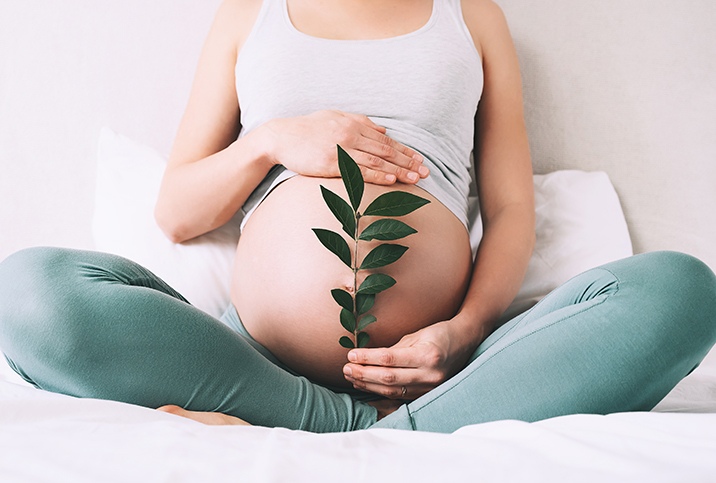Yes, Cancer Treatment Can Impact Fertility, But It's Not All Bad News

A cancer diagnosis is overwhelming and distressing. Determining whether or not you want kids in the future can get lost among the myriad other quick decisions and stressors patients face, such as finalizing treatment plans, financial concerns, informing loved ones and organizing for time away from work. But family planning needs to be top-of-mind for the estimated 89,500 adolescents and young adults (ages 15 to 39) who are diagnosed with cancer each year in the United States.
These AYAs, as they're known, have an 84.6 percent five-year survival rate, according to the National Cancer Institute, meaning planning for the future is not only possible, but critical. In fact, fewer people are losing battles against cancer overall; the American Cancer Society found that the death rate plummeted 31 percent between 1991 and 2018.
The impact on fertility
Unfortunately, many cancer treatments, such as chemotherapy or pelvic area surgeries for uterine, cervical or testicular cancer, can impact fertility by zapping eggs or limiting sperm production, or making it difficult to carry a baby to term.
"For women, this can be particularly toxic because females are born with a certain number of eggs," said Laxmi Kondapalli, M.D., a board-certified reproductive endocrinologist and infertility specialist at CCRM Colorado Fertility Clinic outside Denver.
Patients who receive stem cell or bone marrow transplants, for instance, are at very high risk for infertility because those procedures require high doses of chemotherapy and, in some cases, radiation to the entire body. Kondapalli said the treatments generally pose an 80 percent chance of long-term infertility. Medications can also have fertility implications, she noted, by messing with hormones and preventing women from ovulating or by lowering men's testosterone.
Kondapalli takes many factors into consideration, including a patient's age and specific treatment plan, when assessing the risk of infertility. In 2006, Kondapalli's mentor, Dr. Teresa Woodruff, coined the term "oncofertility" to describe this emerging field at the intersection of oncology and reproductive medicine.
Is a family in the future?
As five-year survival rates generally improve with each decade, questions like "What's next?" become more common.
"This survivorship movement is really thinking, 'Great, we're going to beat cancer but then what?'" said Alison Silberman, CEO of Stupid Cancer, a New York-based nonprofit organization that works to combat isolation among AYAs diagnosed with the disease. "As a young person, there is so much more life happening after. The goal is to be a survivor of cancer but also have a good quality of life after beating cancer."
For many survivors, that may include having a family. It's certainly possible. The key is having conversations with your oncologist and, ideally, a fertility specialist, early on in the process.
Amid everything else they're facing, patients need to have the wherewithal to broach the subject themselves.
"Getting a fertility consultation before undergoing chemotherapy or radiation really opens up the menu of options that a patient will have," Kondapalli said.
The most common preservation routes are sperm banking and freezing eggs; embryos, or fertilized eggs, can also be frozen. The sperm banking procedure—cryopreservation, or freezing a man's sperm—is quick and can be done on the day of diagnosis. Women need to undergo a surgical procedure to harvest their eggs, and the process takes about two weeks. But it's pricey and often not covered by insurance, though some venues offer discounted rates for cancer patients. CNY Fertility, a national fertility treatment provider, estimates the national average cost for egg freezing is $15,000, and that doesn't include storage fees or in vitro fertilization (IVF). In comparison, the nonprofit Alliance for Fertility Preservation finds that sperm banking costs an average of $1,000, plus additional storage fees.
Start the conversation
Though doctors are aware of cancer's potential impact on fertility—in 2018, the American Society of Clinical Oncology published guidelines on discussing the issue with patients—oncologists are focused on cancer treatment, not life afterward. So, amid everything else they're facing, patients need to have the wherewithal to broach the subject themselves.
"This should be part of the conversation with your healthcare team, that this is a side effect in the same way that losing your hair, nausea or fatigue can also be an impact of your treatment," Silberman said.
Adolescents, in particular, may not have kids on their brain, so parents who are overseeing their care need to be aware that infertility is a possible outcome of treatment.
Both Silberman and Kondapalli encouraged patients to ask about the potential fertility impacts of treatment, options for preserving fertility, and how much time they have to make the decision. Engage your partner (if you have one) in these conversations, too. You may be having "The Talk" earlier than you planned, but it's necessary.
These discussions can be additional stressors during an already tense time. Stupid Cancer hosts twice-weekly digital meetups to connect young adult patients and survivors with peers and also posts a list of additional resources on its website.
Even if you ask all the right questions, there are scenarios in which fertility preservation may not be an option—perhaps because cancer treatment needs to start immediately or it's not financially accessible—or pregnancy is too high-risk. That doesn't automatically mean a childless future. In those cases, adoption, surrogacy or using a sperm or egg donor can be viable options. After all, there isn't just one way to start a family.


















